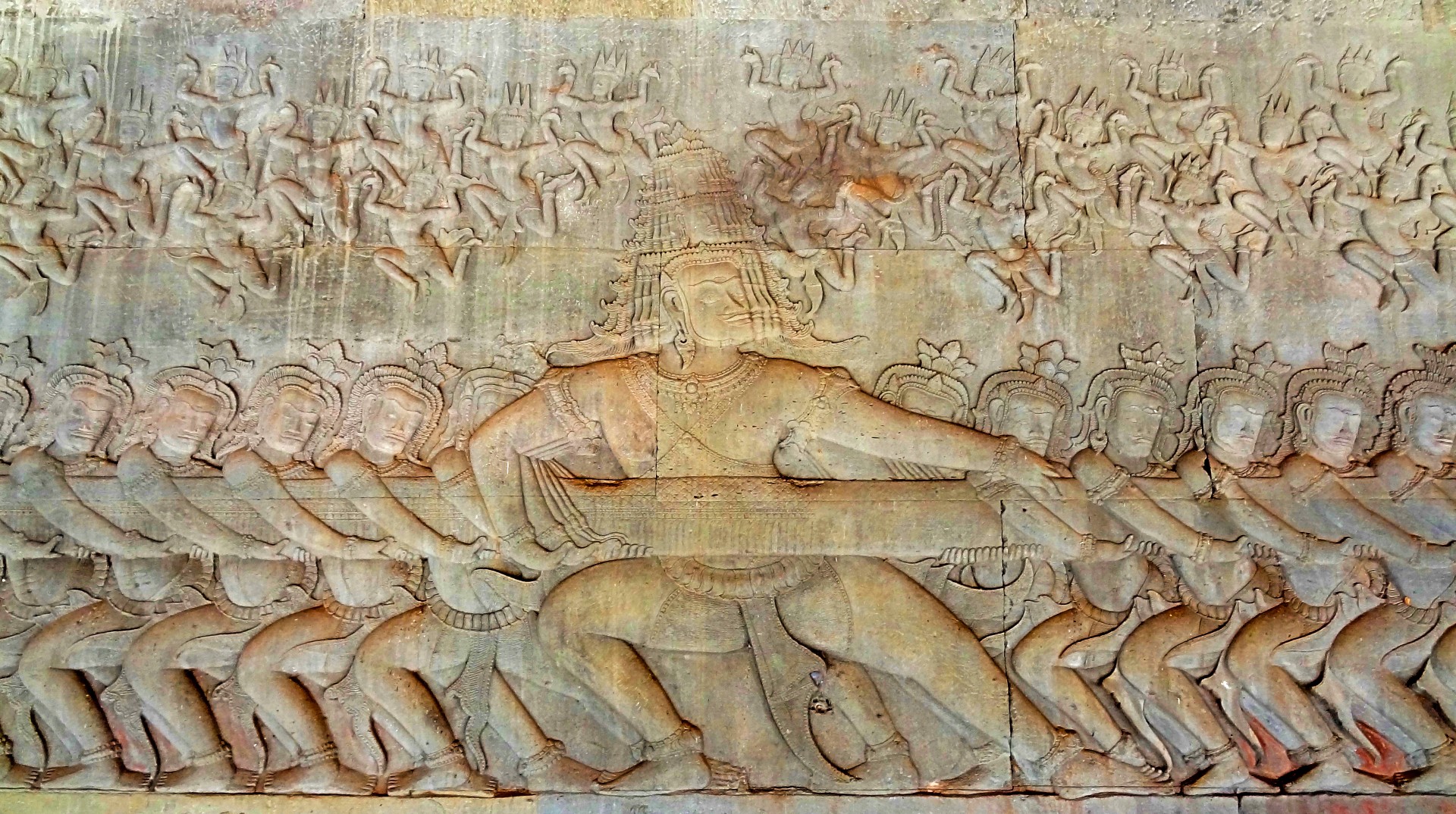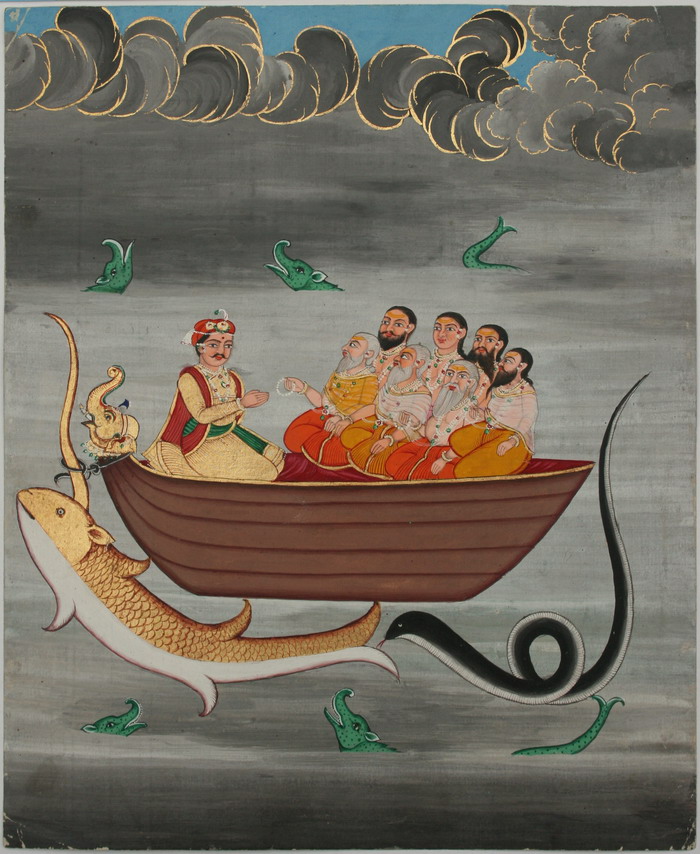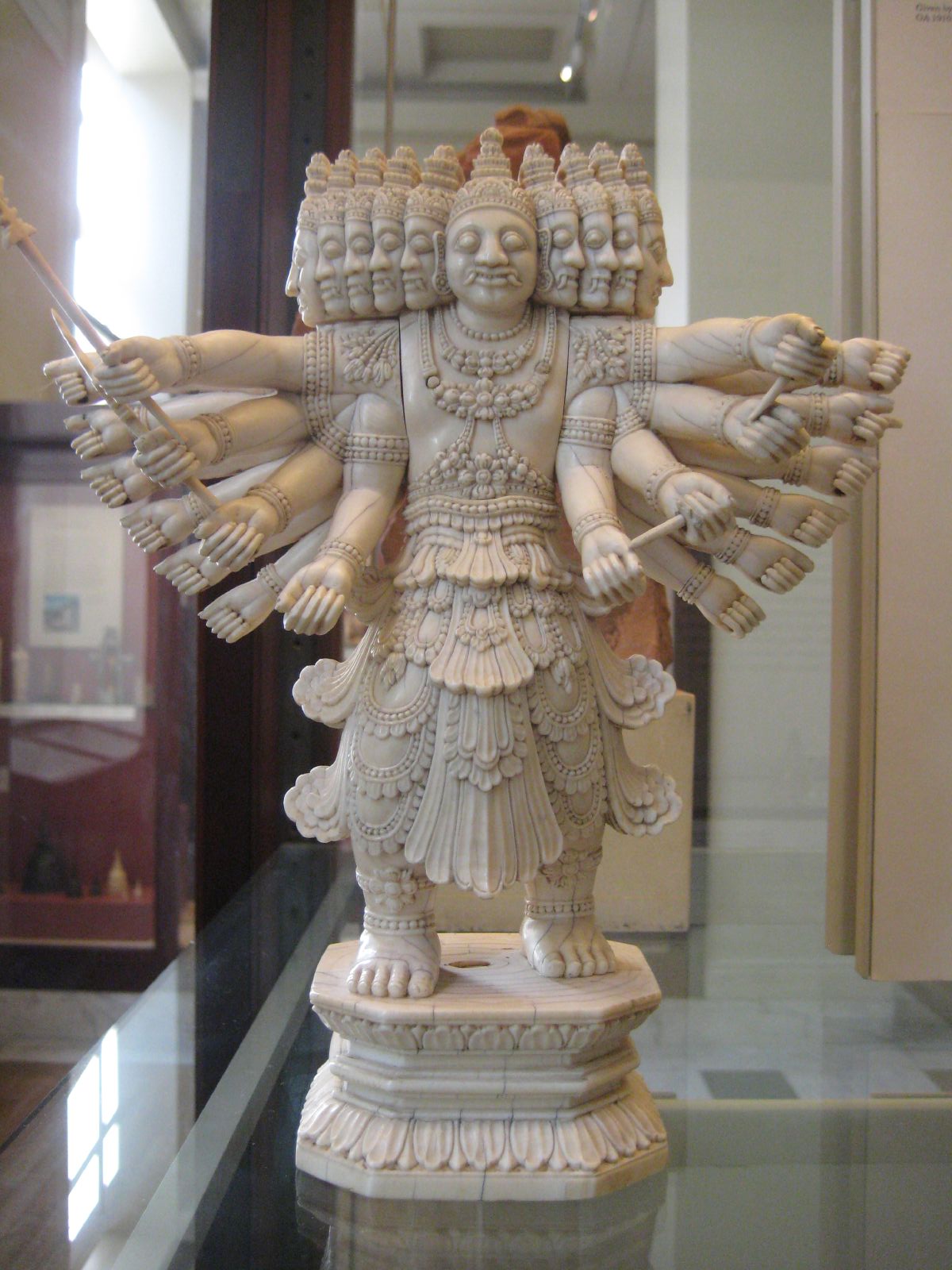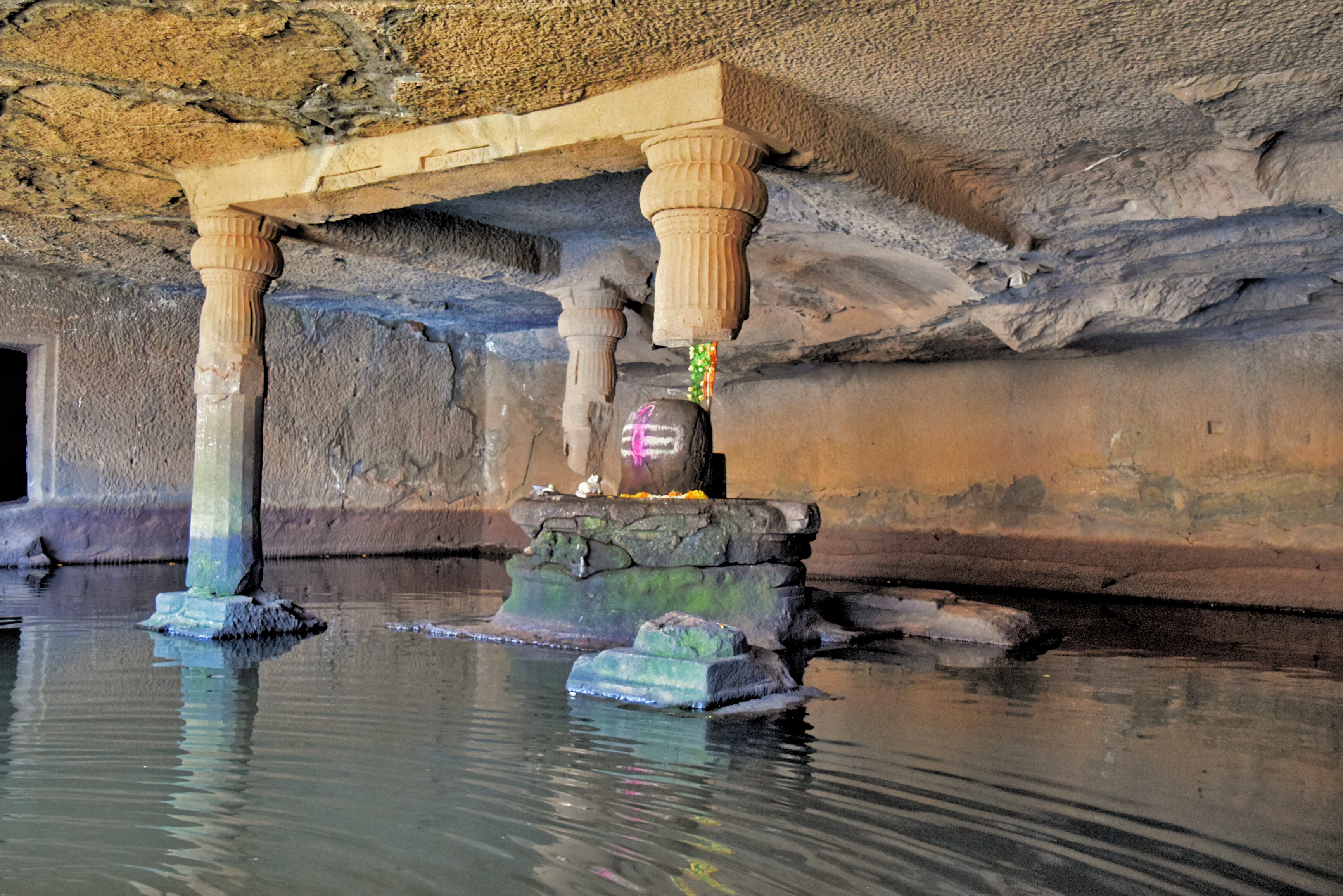|
Hiranyakshipu
Hiranyakashipu (; also known as Hiranyakashyap) was an Asura king of the '' daityas'' from the Puranic scriptures of Hinduism. His name literally translates to "clothed in gold" (''hiranya'' "gold" ''kashipu'' "soft cushion"), and is often interpreted as depicting one who is fond of wealth and sensual comforts. In the Puranas, however, it is also stated the name was derived from a golden throne called 'Hiranyakashipu' the asura sat in or nearby during the ''Atiratra'' (Soma) sacrifice. Hiranyakashipu's younger brother, Hiranyaksha was slain by Varaha avatar of Lord Vishnu. Angered by this, Hiranyakashipu decided to gain magical powers by performing a penance for Lord Brahma. He is subsequently killed by the Narasimha avatar of Lord Vishnu. His tale depicts the futility of desiring power over others and the strength of God's protection over his fully surrendered devotees (in the case of his son Prahlada). Hiranyakashipu, according to legend, earned a boon from Lord Brahma t ... [...More Info...] [...Related Items...] OR: [Wikipedia] [Google] [Baidu] |
Asura
Asuras (Sanskrit: असुर) are a class of beings in Indian religions, Indic religions. They are described as power-seeking clans related to the more benevolent Deva (Hinduism), Devas (also known as Suras) in Hinduism. In its Buddhism, Buddhist context, the word is sometimes translated "Titan (mythology), titan", "demigod", or "antigod". According to Hindu texts, Hindu scriptures, the asuras are in constant battle with the devas. Asuras are described in Indian texts as powerful superhuman demigods with good or bad qualities. In early Vedic literature, the good Asuras are called ''Adityas'' and are led by Varuna, while the malevolent ones are called ''Danava (Hinduism), Danavas'' and are led by Vritra. In the earliest layer of Vedic texts Agni, Indra and other gods are also called Asuras, in the sense of their being "lords" of their respective domains, knowledge and abilities. In later Vedic and post-Vedic texts, the benevolent gods are call ... [...More Info...] [...Related Items...] OR: [Wikipedia] [Google] [Baidu] |
Four Kumaras
The Kumaras are four sages (''rishis'') from the Puranic texts of Hinduism who roam the universe as children, generally named Sanaka kumara, Sanatana kumara, Sanandana kumara and Sanat kumara. They are described as the first mind-born creations and sons of the creator-god Brahma. Born from Brahma's mind, the four Kumaras undertook lifelong vows of celibacy (brahmacharya) against the wishes of their father. They are said to wander throughout the materialistic and spiritualistic universe without any desire but with purpose to teach. All four brothers studied Vedas from their childhood, and always travelled together. The ''Bhagavata Purana'' lists the Kumaras among the twelve ''Mahajanas'' (great devotees or bhakti, bhaktas) who although being eternally Moksha, liberated jiva, souls from birth, still became attracted to the devotional service of Vishnu from their already enlightened state. They play a significant role in a number of Hindu spiritual traditions, especially those a ... [...More Info...] [...Related Items...] OR: [Wikipedia] [Google] [Baidu] |
Rishi
''Rishi'' () is a term for an accomplished and enlightened person. They find mentions in various Vedic texts. Rishis are believed to have composed hymns of the Vedas. The Post-Vedic tradition of Hinduism regards the rishis as "great yogis" or "sages" who after intense meditation (tapas) realized the supreme truth and eternal knowledge, which they composed into hymns.Hartmut Scharfe (2002), Handbook of Oriental Studies, BRILL Academic, , pp. 13–15. The term appears in Pali literature as Ishi and in Buddhism, they can be either Buddhas, Paccekabuddhas, Arahats or a monk of high rank. Etymology According to Indian tradition, the word may be derived from two different meanings of the root 'rsh' (). Sanskrit grammarians derive this word from the second meaning: "to go, to move". V. S. Apte gives this particular meaning and derivation, and Monier-Williams also gives the same, with some qualification. Another form of this root means "to flow, to move near by flowing". (All the ... [...More Info...] [...Related Items...] OR: [Wikipedia] [Google] [Baidu] |
Indra
Indra (; Sanskrit: इन्द्र) is the king of the devas (god-like deities) and Svarga (heaven) in Hindu mythology. He is associated with the sky, lightning, weather, thunder, storms, rains, river flows, and war. volumes/ref> Indra's myths and powers are similar to other Indo-European deities such as Jupiter, Perun, Perkūnas, Zalmoxis, Taranis, Zeus, and Thor, part of the greater Proto-Indo-European mythology. Indra is the most referred deity in the ''Rigveda''. He is celebrated for his powers, and as the one who killed the great evil (a malevolent type of asura) named Vritra, who obstructed human prosperity and happiness. Indra destroys Vritra and his "deceiving forces", and thereby brings rains and sunshine as the saviour of mankind. He is also an important deity worshipped by the Kalash people, indicating his prominence in ancient Hinduism. Indra's significance diminishes in the post-Vedic Indian literature, but he still plays an important role in various m ... [...More Info...] [...Related Items...] OR: [Wikipedia] [Google] [Baidu] |
God Narasimha
In monotheistic thought, God is usually viewed as the supreme being, creator, and principal object of faith. Swinburne, R.G. "God" in Honderich, Ted. (ed)''The Oxford Companion to Philosophy'', Oxford University Press, 1995. God is typically conceived as being omnipotent, omniscient, omnipresent, and omnibenevolent, as well as having an eternal and necessary existence. God is often thought to be incorporeal, evoking transcendence or immanence. Some religions describe God without reference to gender, while others use terminology that is gender-specific and . God has been conceived as either personal or impersonal. In theism, God is the creator and sustainer of the universe, while in deism, God is the creator, but not the sustainer, of the universe. In pantheism, God is the universe itself, while in panentheism, the universe is part (but not the whole) of God. Atheism is an absence of belief in any God or deity, while agnosticism is the belief that the existence of God is un ... [...More Info...] [...Related Items...] OR: [Wikipedia] [Google] [Baidu] |
Rakshasa
Rakshasas ( sa, राक्षस, IAST: : Pali: ''rakkhaso'') lit. 'preservers' are a race of usually malevolent demigods prominently featured in Hindu mythology. According to the Brahmanda Purana, the rakshasas were created by Brahma when he assumed a body of ''tamas'' (darkness), the beings springing forth and promising to protect the waters of creation. They are often depicted to be man-eaters (''nri-chakshas'', ''kravyads''), acting as embodiments of the powers of evil in the Vedic scriptures. They are offered a distinction from yakshas, their cousins who are depicted to be forces of destruction. The term is also used to describe asuras, a class of power-seeking beings that oppose the benevolent devas. They are often depicted as antagonists in Hindu scriptures, as well as in Buddhism and Jainism. The female form of rakshasa is rakshasi. Hinduism In Vedas The Hymn 87 of the tenth mandala of the ''Rigveda'' mentions about Rakshasas. They are classified amongst the ... [...More Info...] [...Related Items...] OR: [Wikipedia] [Google] [Baidu] |
Penance
Penance is any act or a set of actions done out of Repentance (theology), repentance for Christian views on sin, sins committed, as well as an alternate name for the Catholic Church, Catholic, Lutheran, Eastern Orthodox, and Oriental Orthodox sacrament of Reconciliation or Confession. It also plays a part in confession among Anglicanism, Anglicans and Methodism, Methodists, in which it is a Sacrament, rite, as well as among other Protestants. The word ''penance'' derives from Old French and Latin ''paenitentia'', both of which derive from the same root meaning repentance, the desire to be Forgiveness, forgiven (in English see contrition). Penance and repentance, similar in their derivation and original sense, have come to symbolize conflicting views of the essence of repentance, arising from the controversy as to the respective merits of Faith in Christianity, "faith" and "good works". Word derivations occur in many languages. According to dictionary definitions, the primary mea ... [...More Info...] [...Related Items...] OR: [Wikipedia] [Google] [Baidu] |
Deva (Hinduism)
''Deva'' (; Sanskrit: , ) means "shiny", "exalted", "heavenly being", "divine being", "anything of excellence", and is also one of the Sanskrit terms used to indicate a deity in Hinduism.Monier Monier-Williams, A Sanskrit-English Dictionary” Etymologically and Philologically Arranged to cognate Indo-European Languages, Motilal Banarsidass, page 492 ''Deva'' is a masculine term; the feminine equivalent is '' Devi''. In the earliest Vedic literature, all supernatural beings are called ''Devas''George Williams (2008), A Handbook of Hindu Mythology, Oxford University Press, , pages 90, 112 and ''Asuras''. The concepts and legends evolved in ancient Indian literature, and by the late Vedic period, benevolent supernatural beings are referred to as ''Deva-Asuras''. In post-Vedic Hindu texts, such as the Puranas and the Itihasas of Hinduism, the ''Devas'' represent the good, and the ''Asuras'' the bad. In some medieval works of Indian literature, ''Devas'' are also referred to ... [...More Info...] [...Related Items...] OR: [Wikipedia] [Google] [Baidu] |
Devas Approach Vishnu To Requesting Him To Control Hiranya Kashipu
{{Disambiguation, surname ...
Devas may refer to: * Devas Club, a club in south London * Anthony Devas (1911–1958), British portrait painter * Charles Stanton Devas (1848–1906), political economist * Jocelyn Devas (died 1886), founder of the Devas Club * Devas (band), Romanian music band * Dewas, a city in Madhya Pradesh, India See also * Deva (other) Deva may refer to: Entertainment * ''Deva'' (1989 film), a 1989 Kannada film * ''Deva'' (1995 film), a 1995 Tamil film * ''Deva'' (2002 film), a 2002 Bengali film * Deva (2007 Telugu film) * ''Deva'' (2017 film), a 2017 Marathi film * Deva ... [...More Info...] [...Related Items...] OR: [Wikipedia] [Google] [Baidu] |
Asura
Asuras (Sanskrit: असुर) are a class of beings in Indian religions, Indic religions. They are described as power-seeking clans related to the more benevolent Deva (Hinduism), Devas (also known as Suras) in Hinduism. In its Buddhism, Buddhist context, the word is sometimes translated "Titan (mythology), titan", "demigod", or "antigod". According to Hindu texts, Hindu scriptures, the asuras are in constant battle with the devas. Asuras are described in Indian texts as powerful superhuman demigods with good or bad qualities. In early Vedic literature, the good Asuras are called ''Adityas'' and are led by Varuna, while the malevolent ones are called ''Danava (Hinduism), Danavas'' and are led by Vritra. In the earliest layer of Vedic texts Agni, Indra and other gods are also called Asuras, in the sense of their being "lords" of their respective domains, knowledge and abilities. In later Vedic and post-Vedic texts, the benevolent gods are call ... [...More Info...] [...Related Items...] OR: [Wikipedia] [Google] [Baidu] |
Daksha
In Hinduism, Daksha (Sanskrit: दक्ष, IAST: , lit. "able, dexterous, or honest one") is one of the '' Prajapati'', the agents of creation, as well as a divine king-rishi. His iconography depicts him as a man with a stocky body and a handsome face or the head of a goat. In the ''Rigveda'', Daksha is an ''Aditya'' and is associated with priestly skills. In the epics and ''Puranic'' scriptures, he is a ''son'' of the creator god Brahma and the father of many children, who became the progenitors of various creatures. According to one legend, an egoistic Daksha conducted a yajna (fire sacrifice) and didn't invite his youngest daughter Sati and her husband Shiva. He was beheaded by Virabhadra for insulting Sati and Shiva but was later resurrected with the head of a goat. Many ''Puranas'' state that Daksha was reborn to Prachetas in another ''Manvantara'' (age). Etymology and textual history The meaning of the word "Daksha" (दक्ष) is "able", "expert", "skillful" or ... [...More Info...] [...Related Items...] OR: [Wikipedia] [Google] [Baidu] |
Satya Yuga
''Satya Yuga'' ( ''Krita Yuga''), in Hinduism, is the first and best of the four ''yugas'' (world ages) in a ''Yuga Cycle'', preceded by ''Kali Yuga'' of the previous cycle and followed by ''Treta Yuga''. ''Satya Yuga'' lasts for 1,728,000 years (4,800 divine years). ''Satya Yuga'' is known as the age of truth, when humanity is governed by gods, and every manifestation or work is close to the purest ideal and humanity will allow intrinsic goodness to rule supreme. It is sometimes referred to as the "Golden Age". The god ''Dharma'' (depicted in the form of a bull), which symbolizes morality, stood on all four legs during this period. The legs of ''Dharma'' reduce by one in each ''yuga'' that follows. Etymology ''Yuga'' ( sa, युग), in this context, means "an age of the world", where its archaic spelling is ''yug'', with other forms of ''yugam'', , and ''yuge'', derived from ''yuj'' ( sa, युज्, , to join or yoke), believed derived from ' (Proto-Indo-European: 'to j ... [...More Info...] [...Related Items...] OR: [Wikipedia] [Google] [Baidu] |




.jpg)
_(cropped).jpg)

.jpg)


